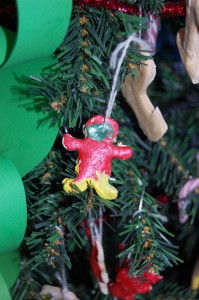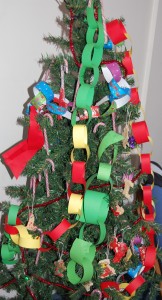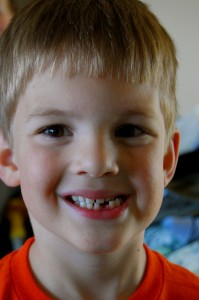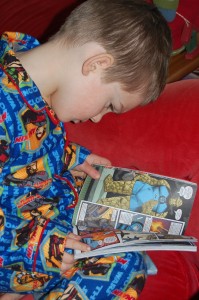
 We recently encountered a situation where friend of my kids stole some toys from the house. I was in the living room while the boy was playing nearby. I noticed that he kept looking at me to see if I was watching him while he played. I saw him fold some toys in his hands and then casually get up and go out of the room. I thought I saw him put something in his pocket. He said he was going to go visit another friend. My suspicion increased. I was pretty sure some of our lego guys were in his pockets so I asked him if he had put any of the legos in his pocket. He told me no and I asked him if he was sure. He was sure. I was pretty confident I had seen him sneak the legos away and put them in his pocket but I knew I could have been wrong. My mind started reeling. What should I do? How should I handle this? Why didn’t I ask him to empty his pockets (nicely of course)?
We recently encountered a situation where friend of my kids stole some toys from the house. I was in the living room while the boy was playing nearby. I noticed that he kept looking at me to see if I was watching him while he played. I saw him fold some toys in his hands and then casually get up and go out of the room. I thought I saw him put something in his pocket. He said he was going to go visit another friend. My suspicion increased. I was pretty sure some of our lego guys were in his pockets so I asked him if he had put any of the legos in his pocket. He told me no and I asked him if he was sure. He was sure. I was pretty confident I had seen him sneak the legos away and put them in his pocket but I knew I could have been wrong. My mind started reeling. What should I do? How should I handle this? Why didn’t I ask him to empty his pockets (nicely of course)?
It turned out he left something at our house andI knew he had to come back, so I waited. My husband came home and I told him what happened. We talked about it and decided to wait for the boy to come back. When he came for his forgotten object, my husband casually asked, “We are missing some legos, did any end up in your pockets? Could you check?” The boy felt in his pockets and said, “Oh, I guess I put some in there.” Busted.
My husband said, “Thanks for checking. We don’t want to lose our legos.” And off the boy went back to his house. After he left my husband and I realized we have several options on how to deal with this situation.
How would we want someone else to deal with our children should they steal something from another child? We would want them to be kind, but direct. Not yell and shame. I’m glad for his sake that he got caught. Learning at a young age when the consequences are less costly is a lot better than learning them when the “price is higher” (i.e. stealing toys from a friend when you are 6 or 7 years old vs. stealing $$ from friends while older or stealing cars etc.) Of course a 4 year old taking toys from a friend’s house deserves a different approach to consequences than a 6+ old child. A 4 year old may not fully understand what he/she did was wrong and need to be told directly “taking toys from a friend’s house without permission is wrong”. A 7/8 year old is much more aware of appropriate behavior at a playmate’s house.
What should the consequences be for that child the next time he comes to our house? Possible options:
- Tell his parents and come up with a plan together.
- Make sure we put the legos away when he comes over to play. (The boy likes legos a lot so I think they are a particular temptation for him)
- Ask him to check his legos to make sure that none of our other legos “accidentally” made it back to his home.
- Not let him play at our house anymore.
- Be a little more direct and tell him we know that it wasn’t an accident that those legos ended up in his pockets and that he won’t be allowed to play legos at our house anymore.
- Check his pockets everytime he leaves our house.
- Let it go and hope he doesn’t do it again.
Some of these options are more appealing than others. What we ended up doing was talking to his parents and let them know what happened. I talked to his mom and told her that if the situation was reversed I would want to know what was going on with my kid. We had a good conversation (although I admit I was very nervous because I don’t know the parents VERY well and I was worried about relational consequences–would she think I was accusing her of being a bad parent? Their faith beliefs are different from ours–would she feel like we were being judgemental religious people? Would she think I made the whole thing up?). I told her that her son is always welcome to come play at our house. He is a very sweet boy and he plays well with the kids. She was glad I told her and shared with me some things going on with the boy.
My husband and I decided that we would keep the legos put away when he comes to play and that he is welcome to play at our house anytime. I feel satisfied in the way we handled the situation. This was one of those issues that surprised me–I wasn’t really expecting to deal with stealing at such young ages (okay, I don’t think I was even aware that I MIGHT have to deal with it one day). It was a good life lesson for all involved.
Have you ever encountered a similar situation? How did you handle it?
photo courtesy of pooyall

 When we moved to England 3 months ago we left our Christmas decorations behind. We are only planning on being here for 4 years and we live in a small flat with little storage. We only brought the necessities and Christmas decorations didn’t make the cut. As Christmas was approaching the kids started talking about getting a Christmas tree and hanging up stockings. My husband is in graduate school and we are living on a pretty tight budget. I didn’t want to spend very much money on buying a tree, ornaments, stockings, lights etc. We wanted to keep with tradition and make Christmas in England feel like “home” but spend as little as possible.
When we moved to England 3 months ago we left our Christmas decorations behind. We are only planning on being here for 4 years and we live in a small flat with little storage. We only brought the necessities and Christmas decorations didn’t make the cut. As Christmas was approaching the kids started talking about getting a Christmas tree and hanging up stockings. My husband is in graduate school and we are living on a pretty tight budget. I didn’t want to spend very much money on buying a tree, ornaments, stockings, lights etc. We wanted to keep with tradition and make Christmas in England feel like “home” but spend as little as possible.
I asked my mom if she could find the storage box and send our stockings to us from the US. She didn’t want to mess with digging through our Christmas boxes so she generoulsy ordered some stockings online for the kids and sent them to us. We bought the cheapest reusable Christmas at a store (costing $11!) so we can use it for the next 4 years, one strand of twinkle lights, and 2 boxes of candy canes. Everything else we had at home.
Here is what we have on our tree:
- Paper chains
- Homemade salt dough ornaments painted by the kids
- Candy Canes
- Sparkley red ribbon left behind from the previous flat-renters
- Twinkle lights
- Stringed popcorn (still in the process)
 I like it when my tree looks pretty with full lights and is decorated with my pretty ornaments. But I gotta tell you, our kids LOVE their home decorated tree! They are so proud that everything on it is something they helped make or find in our flat to decorate it with. Our tree has lights on the top half and has ornaments unevenly distributed everywhere. The paper chains are not cut evenly either. But it has lots of flair and personality and it brings a smile to my face when I look at it. We all worked hard to put our tree together and I love that they love it.
I like it when my tree looks pretty with full lights and is decorated with my pretty ornaments. But I gotta tell you, our kids LOVE their home decorated tree! They are so proud that everything on it is something they helped make or find in our flat to decorate it with. Our tree has lights on the top half and has ornaments unevenly distributed everywhere. The paper chains are not cut evenly either. But it has lots of flair and personality and it brings a smile to my face when I look at it. We all worked hard to put our tree together and I love that they love it.
We spent very little money–especially since we can reuse everything except the popcorn and maybe the candy canes. I have found that I don’t need fancy decorations for Christmas to feel like Christmas. Spending time with my family and remembering why we celebrate Christmas in the first place has been a great reminder for me this year.
What fun things to you put on your tree? Favorite homemade decorations? Best Christmas budget ideas?

 My 6 year recently lost his second tooth. With the new tooth growing in I became more aware that his thumb sucking really needed to come to an end. Once he started losing teeth I started seeing $$dollar signs$$ about future dental visits and braces and it was very tempting to try and have a more tight fisted attitude about him quitting. I casually mentioned to him that his teeth would start growing in incorrectly if he kept sucking his thumb and that it was probably a good idea to stop. He said “okay” and we came up with a plan. I don’t have a formal chart but we have decided to let him have a special fizzy or juice drink on the weekend if he keeps the thumb out of the mouth during the week.
My 6 year recently lost his second tooth. With the new tooth growing in I became more aware that his thumb sucking really needed to come to an end. Once he started losing teeth I started seeing $$dollar signs$$ about future dental visits and braces and it was very tempting to try and have a more tight fisted attitude about him quitting. I casually mentioned to him that his teeth would start growing in incorrectly if he kept sucking his thumb and that it was probably a good idea to stop. He said “okay” and we came up with a plan. I don’t have a formal chart but we have decided to let him have a special fizzy or juice drink on the weekend if he keeps the thumb out of the mouth during the week.
He started sucking his thumb when he was a baby–around 2 or 3 months old. As he got a little older, his pattern for sucking his thumb was to hold his blankie, rub the satin on his nose and suck his thumb at the same time. I was worried that maybe we would have to get rid of his blankie and all things satin since for him, seeing satin was a Pavlovian response: see/touch satin=suck thumb. He was never the type who would just walk around with his thumb in his mouth or do activities while thumbsucking. If he got bored he would go to his bed and have some “blankie/thumbsucking time”. Sometimes, but not always he would suck his thumb before falling asleep.
 I think it worked to our favor that we read this book several times when we checked it out from the library: Laurie Keller’s Open Wide: Tooth School Inside. If you have not read this book to your kids I do recommend it. Our kids learned all about cavities and germs and tooth care from this book. Laurie Keller has some really GREAT books that our kids LOVE–they have made them giggle and laugh many times. I digress.
I think it worked to our favor that we read this book several times when we checked it out from the library: Laurie Keller’s Open Wide: Tooth School Inside. If you have not read this book to your kids I do recommend it. Our kids learned all about cavities and germs and tooth care from this book. Laurie Keller has some really GREAT books that our kids LOVE–they have made them giggle and laugh many times. I digress.
We asked the 6 year old if he could still rub satin on his nose and hold his blankie without sucking his thumb and he said he really thought he could. (Blankie will go away another day). We gave it a try and he did it. Easy peazy-lemon squeezy as he would say.
I know that getting children to stop sucking their thumbs is not always that easy. I have a good friend who made a chart for her son while he was in training not to suck his thumb. He was more inclined to suck him thumb while watching tv or when he was bored. He didn’t have a pavlovian cue like mine did. He gets a marshmallow at the end of the day if he succeeds. Behavior charts seem to work well for kids who are learning how to stop sucking their thumbs.
In general when it comes to behavior change positive rewards work much better than shame and anger. When it comes time for our 5 year old to stop sucking his thumb I think it won’t be quite as easy. He is like his brother in that he likes to snuggle with his blankie and suck his thumb but he seems more attached to it than the 6 year old. Perhaps waiting until he is 6 will make a big difference to him and he will find it as easy as his brother.
Tips for helping children stop sucking their thumbs:
- Behavior and reward charts
- Praise when you see them succeed (catch them doing something right!!)
- Don’t yell or nag
- Remember that peer/social pressures can work to your advantage. Once your children are school age and notice that their friends don’t suck their thumbs they want to less and less.
- If you find they suck more when bored keep a list or box of special activities to do when boredom strikes.
- Stay positive yourself and tell them you know they can do it.
- You can try the gross tasting stuff you paint on the thumb or a thumb guard to help if other methods haven’t worked.
Have any thumbsuckers at your house? What’s worked for you? Disasters? How old were your kids when they stopped thumbsucking?

 Have you ever dealt with a child who wets the bed? We are dealing with the issue of bedwetting right now, and I gotta tell you it is stressful. Our oldest child has trouble staying dry all night. We had him in pull ups at night until this summer when we decided to give it a go and take off the pull ups. We would take him pee at night right before we went to bed and he would stay dry the rest of the night. He was waking up very early because he had to wake up and pee and then couldn’t go back to sleep–but we thought it was great that he was waking up to go.
Have you ever dealt with a child who wets the bed? We are dealing with the issue of bedwetting right now, and I gotta tell you it is stressful. Our oldest child has trouble staying dry all night. We had him in pull ups at night until this summer when we decided to give it a go and take off the pull ups. We would take him pee at night right before we went to bed and he would stay dry the rest of the night. He was waking up very early because he had to wake up and pee and then couldn’t go back to sleep–but we thought it was great that he was waking up to go.
Then we moved to England. Once we arrived in Enlgand everything started off fine. Until school started. Our oldest is in public school and the adjustment of going to school for 6 hours a day and being very tired by the end of the day made bedwetting a bigger issue. He was wetting the bed two times a night most nights. We armed oursevled with washable puddle pads that we put over his flat sheet so that if he did have an accident we could take that off and replace it with a fresh one. That way we weren’t having to change sheets in the middle of the night.
Here is his nightly routine:
- Books before bed.
- Last pee of the night
- Lights out and songs.
- Sleep.
- We take him pee before we go to bed sometime between 10 and 12. We usually try to aim for 10:30 because the chances of him having an accident after 10:30 increase by the minute.
- If we are too late then we change jammies, change the puddle pad and have him empty his bladder. Occasionally, depending on how he is sleeping the accident may get on his comforter, sheets, or blankie. Throw those into the kitchen where the washer is so they can be washed the next morning.
- Sometime between 2am and 4:30, whichever parent wakes up first, will take him pee again. Occasionally we are too late and we have to repeat the above step.
- Rejoice in the morning if he stayed dry all night (and I have no more laundry to do).
Now, this may not be the BEST way to handle bedwetting at night but it works for us for now. I don’t enjoy having interrupted sleep in the middle of the night and dealing with taking him to the toilet but I dislike even more dealing with wet jammies and extra loads of laundry.
A few weeks ago I was getting concerned that maybe there was something else going on with him–a medical problem. I started doing some research (talking to other parents and reading on the web) about bedwetting in school age children.
Here is what I learned:
- It is common for boys especially to struggle with bedwetting.
- Some children don’t produce the hormone that supresses the body from making urine at night until they are older. In some cases, not until puberty.
- It isn’t their fault. They aren’t doing it on purpose. They can’t help it. They aren’t lazy.
- Using things like sticker charts won’t really be helpful because bedwetting is not something that children can control. It isn’t the same thing as using a sticker chart for thumb sucking or doing chores.
- Use empathy and love when your children have an accident. Use all your might to not show any anger toward your child if they have an accident.
- Stress makes bedwetting worse. (In our case starting school was making it worse for our child. Showing anger and frustration about bedwetting can also make it worse.)
- If you suspect a medical problem, take the child in for a check up and talk to the pediatrician.
- Some websites said that taking them to the toilet at night doesn’t really teach the child anything–it more trains the parent than anything else.
- If your child is old enough for sleepovers you can ask your doctor about a prescription the child can take to not wet the bed. Or teach your child how to discreetly use pull ups to avoid being embarrassed about needing them at night.
- Encourage your child when he has an accident and tell him he will grow out of it. (It doesn’t bother our child that he has accidents at night. He isn’t embarrassed about it for the time being but I suspect that he will get there if this issue doesn’t resolve itself in the next year.)
- Take heart, you aren’t the only parent out there dealing with extra laundry due to bedwetting!
How have you dealt with bedwetting? What has worked for you?

 Learning how to read is a major milestone that children pass during their first years of school. Reading doesn’t come easily for every child. Some children are eager and want to learn how to read. They ask their parents to teach them. Some are more interested in playing outside than taking time to sit down and learn all the letter sounds and sound blends.
Learning how to read is a major milestone that children pass during their first years of school. Reading doesn’t come easily for every child. Some children are eager and want to learn how to read. They ask their parents to teach them. Some are more interested in playing outside than taking time to sit down and learn all the letter sounds and sound blends.
I have 2 children who are beginning readers. My 5 year old, Isaac, taught himslef how to read when he was 4. As a 2 year old he was very interested in letters and would play with his Little Touch Leappad everyday to learn all the letters because he enjoyed it. During preschool last year he got a stronger grip on the letter sounds and figured out on his own how to sound out and read consonant-vowel-consonant words. He also remembered words and what they looked like and even skipped over having to sound out each sound in a word. He did all those things without much help from us. He would often surprise us when he could read words like “dragon” or “think”. His older brother, Ewan, wasn’t as interested in letter learning and preferred to spend his time doing other things. During his preschool he learned all the letters and their sounds too but it didn’t excite him as much. Now that our 6 year old is in public school and is learning how to read we are discovering that reading doesn’t come as easily for him as it did for his brother. I think he is average for his age and that it will click with him in time.
Here are some tips I’ve discovered in our (short) journey in helping our children read:
1) Don’t force it. Most children will start reading and showing interest when they are ready. Putting pressure on them will only give them a distaste for trying. When Isaac (the younger) started reading before Ewan (the oldest), I felt like Ewan should be catching up with him simply because Ewan is older. It took me a while to relax and realize that children learn differently and at different paces.
2) Get some early reader books. We have a set of books called BOB Books that we like a lot. They are very short and when a beginning reader can read it they feel accomplished. There are several “I Can Read” books available for more advanced early readers too. Jack and Annie Magic Treehouse books are also good books for (more advanced) early readers. The stories are interesting to keep kids engaged and reading on their own.
3) When teaching your kids the letters of the alphabet spend more time talking about the letter sounds than the letter names. When it comes to reading the letter name doesn’t matter as much as the sounds it makes.
4)We’ve used the book Teach Your Child To Read in 100 Easy Lessons. I like this book a lot and it has helped Ewan make progress in his reading skills. We are only on lesson 26 now but I’ve noticed a difference. Before school started we were doing daily lessons but since school is in session it is more difficult to do it everyday.
5) Practice reading everyday. Even just 10 minutes a day.
6) Read to your children everyday.
7) Try an online program to teach phonics and early reading skills. Starfall is a GREAT pre-reading website for kids. Explode the Code has an online program that is interactive and fun for kids. Explode the Code teaches phonics and reading. A one year subscription costs $55 and is worth the investment. Explode the Code also has workbooks that children love and the online program in based on the workbooks. We bought a subscription for our homeschool this year and both boys spend time on it several times a week. I have found that since Ewan is in public school he is more excited about coming home and doing some Explode the Code online than he would be at doing a workbook. The online program monitors their successes and automatically adjusts the lessons to their difficulty level. BBC also has several games and reading activities online that you can have your kids play.
8) Praise their efforts and willingness to try a new reading challenge.
What have you done to encourage your kids in their reading? What challenges have you overcome?
 We recently encountered a situation where friend of my kids stole some toys from the house. I was in the living room while the boy was playing nearby. I noticed that he kept looking at me to see if I was watching him while he played. I saw him fold some toys in his hands and then casually get up and go out of the room. I thought I saw him put something in his pocket. He said he was going to go visit another friend. My suspicion increased. I was pretty sure some of our lego guys were in his pockets so I asked him if he had put any of the legos in his pocket. He told me no and I asked him if he was sure. He was sure. I was pretty confident I had seen him sneak the legos away and put them in his pocket but I knew I could have been wrong. My mind started reeling. What should I do? How should I handle this? Why didn’t I ask him to empty his pockets (nicely of course)?
We recently encountered a situation where friend of my kids stole some toys from the house. I was in the living room while the boy was playing nearby. I noticed that he kept looking at me to see if I was watching him while he played. I saw him fold some toys in his hands and then casually get up and go out of the room. I thought I saw him put something in his pocket. He said he was going to go visit another friend. My suspicion increased. I was pretty sure some of our lego guys were in his pockets so I asked him if he had put any of the legos in his pocket. He told me no and I asked him if he was sure. He was sure. I was pretty confident I had seen him sneak the legos away and put them in his pocket but I knew I could have been wrong. My mind started reeling. What should I do? How should I handle this? Why didn’t I ask him to empty his pockets (nicely of course)?
 When we moved to England 3 months ago we left our Christmas decorations behind. We are only planning on being here for 4 years and we live in a small flat with little storage. We only brought the necessities and Christmas decorations didn’t make the cut. As Christmas was approaching the kids started talking about getting a Christmas tree and hanging up stockings. My husband is in graduate school and we are living on a pretty tight budget. I didn’t want to spend very much money on buying a tree, ornaments, stockings, lights etc. We wanted to keep with tradition and make Christmas in England feel like “home” but spend as little as possible.
When we moved to England 3 months ago we left our Christmas decorations behind. We are only planning on being here for 4 years and we live in a small flat with little storage. We only brought the necessities and Christmas decorations didn’t make the cut. As Christmas was approaching the kids started talking about getting a Christmas tree and hanging up stockings. My husband is in graduate school and we are living on a pretty tight budget. I didn’t want to spend very much money on buying a tree, ornaments, stockings, lights etc. We wanted to keep with tradition and make Christmas in England feel like “home” but spend as little as possible. I like it when my tree looks pretty with full lights and is decorated with my pretty ornaments. But I gotta tell you, our kids LOVE their home decorated tree! They are so proud that everything on it is something they helped make or find in our flat to decorate it with. Our tree has lights on the top half and has ornaments unevenly distributed everywhere. The paper chains are not cut evenly either. But it has lots of flair and personality and it brings a smile to my face when I look at it. We all worked hard to put our tree together and I love that they love it.
I like it when my tree looks pretty with full lights and is decorated with my pretty ornaments. But I gotta tell you, our kids LOVE their home decorated tree! They are so proud that everything on it is something they helped make or find in our flat to decorate it with. Our tree has lights on the top half and has ornaments unevenly distributed everywhere. The paper chains are not cut evenly either. But it has lots of flair and personality and it brings a smile to my face when I look at it. We all worked hard to put our tree together and I love that they love it. My 6 year recently lost his second tooth. With the new tooth growing in I became more aware that his thumb sucking really needed to come to an end. Once he started losing teeth I started seeing $$dollar signs$$ about future dental visits and braces and it was very tempting to try and have a more tight fisted attitude about him quitting. I casually mentioned to him that his teeth would start growing in incorrectly if he kept sucking his thumb and that it was probably a good idea to stop. He said “okay” and we came up with a plan. I don’t have a formal chart but we have decided to let him have a special fizzy or juice drink on the weekend if he keeps the thumb out of the mouth during the week.
My 6 year recently lost his second tooth. With the new tooth growing in I became more aware that his thumb sucking really needed to come to an end. Once he started losing teeth I started seeing $$dollar signs$$ about future dental visits and braces and it was very tempting to try and have a more tight fisted attitude about him quitting. I casually mentioned to him that his teeth would start growing in incorrectly if he kept sucking his thumb and that it was probably a good idea to stop. He said “okay” and we came up with a plan. I don’t have a formal chart but we have decided to let him have a special fizzy or juice drink on the weekend if he keeps the thumb out of the mouth during the week. I think it worked to our favor that we read this book several times when we checked it out from the library:
I think it worked to our favor that we read this book several times when we checked it out from the library:  Have you ever dealt with a child who wets the bed? We are dealing with the issue of bedwetting right now, and I gotta tell you it is stressful. Our oldest child has trouble staying dry all night. We had him in pull ups at night until this summer when we decided to give it a go and take off the pull ups. We would take him pee at night right before we went to bed and he would stay dry the rest of the night. He was waking up very early because he had to wake up and pee and then couldn’t go back to sleep–but we thought it was great that he was waking up to go.
Have you ever dealt with a child who wets the bed? We are dealing with the issue of bedwetting right now, and I gotta tell you it is stressful. Our oldest child has trouble staying dry all night. We had him in pull ups at night until this summer when we decided to give it a go and take off the pull ups. We would take him pee at night right before we went to bed and he would stay dry the rest of the night. He was waking up very early because he had to wake up and pee and then couldn’t go back to sleep–but we thought it was great that he was waking up to go. Learning how to read is a major milestone that children pass during their first years of school. Reading doesn’t come easily for every child. Some children are eager and want to learn how to read. They ask their parents to teach them. Some are more interested in playing outside than taking time to sit down and learn all the letter sounds and sound blends.
Learning how to read is a major milestone that children pass during their first years of school. Reading doesn’t come easily for every child. Some children are eager and want to learn how to read. They ask their parents to teach them. Some are more interested in playing outside than taking time to sit down and learn all the letter sounds and sound blends.
